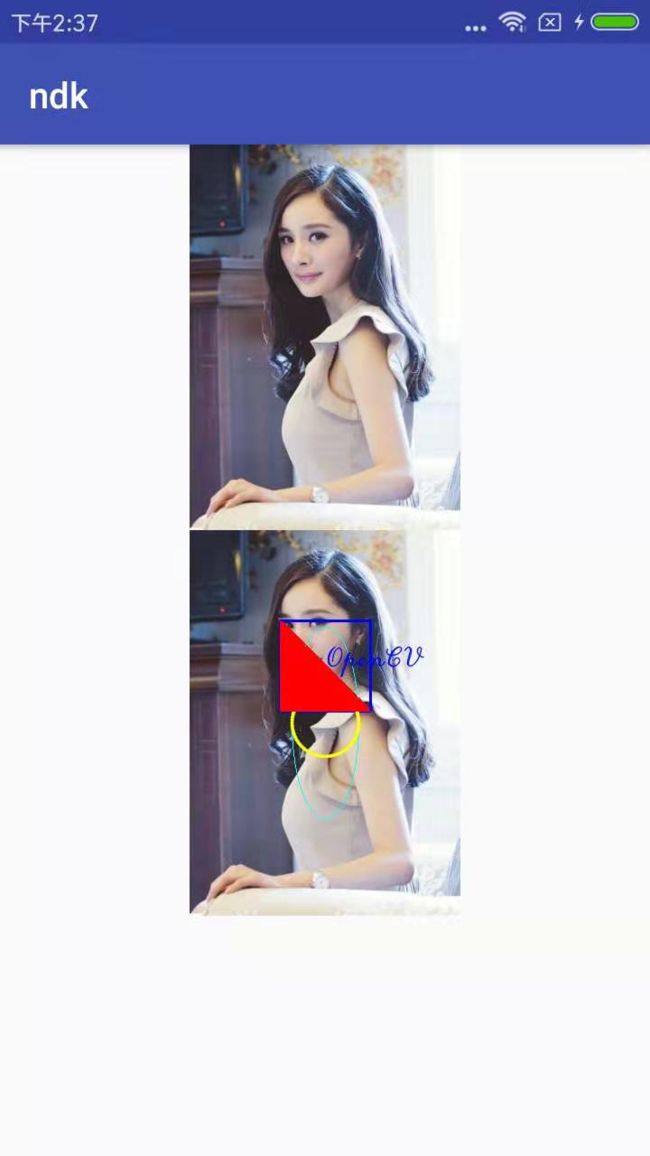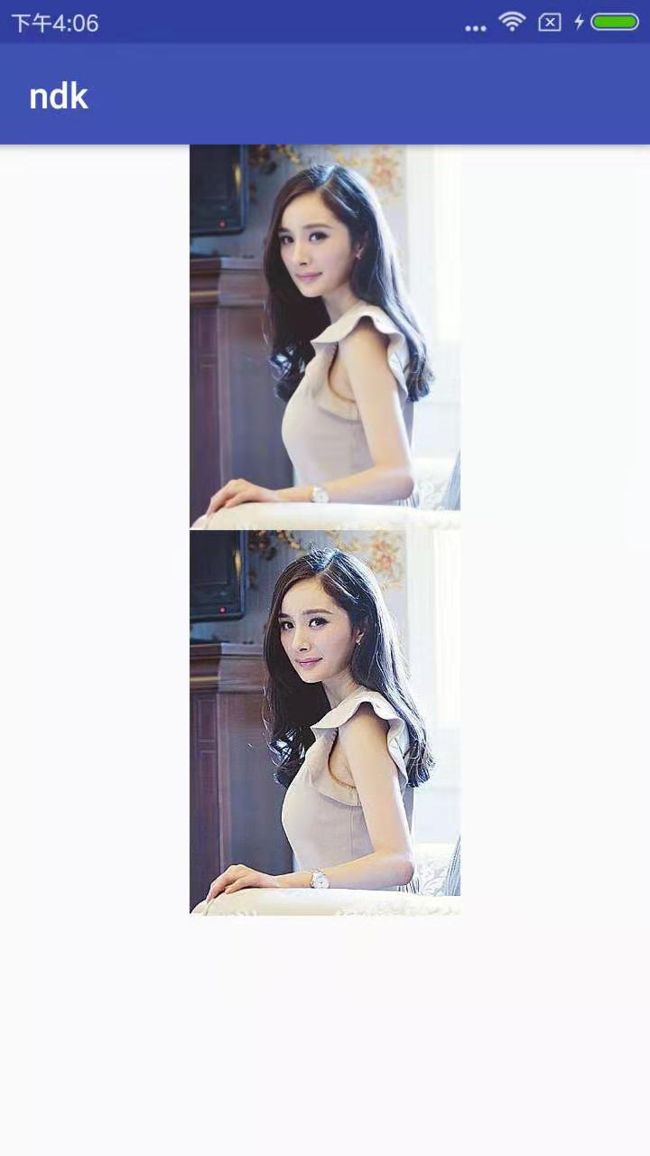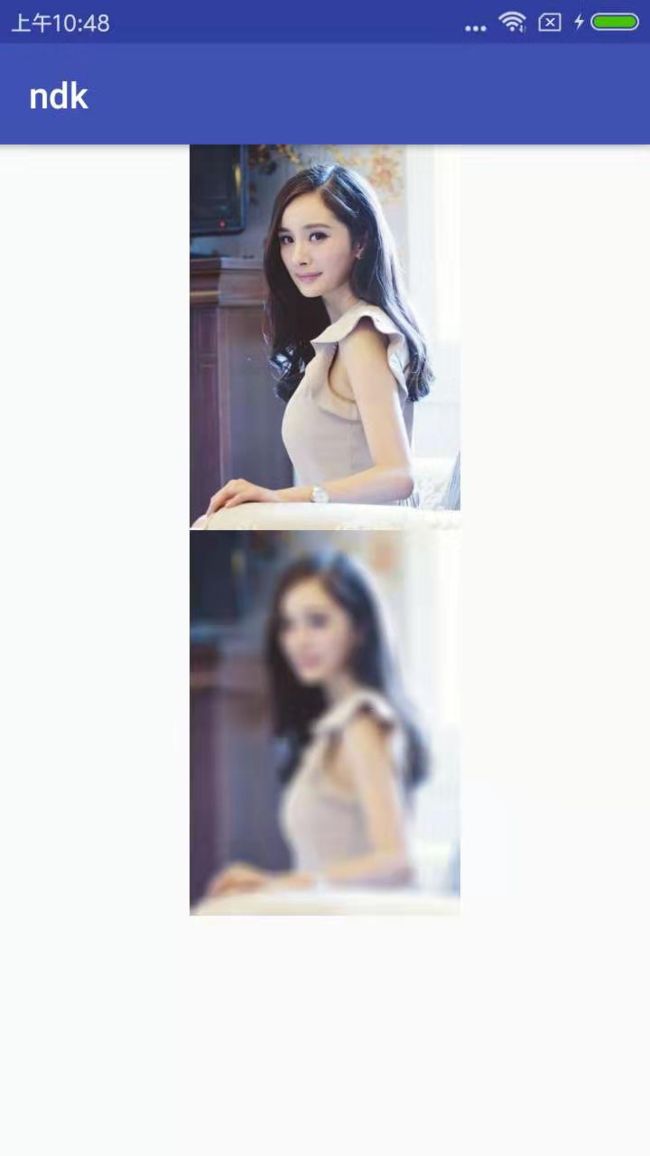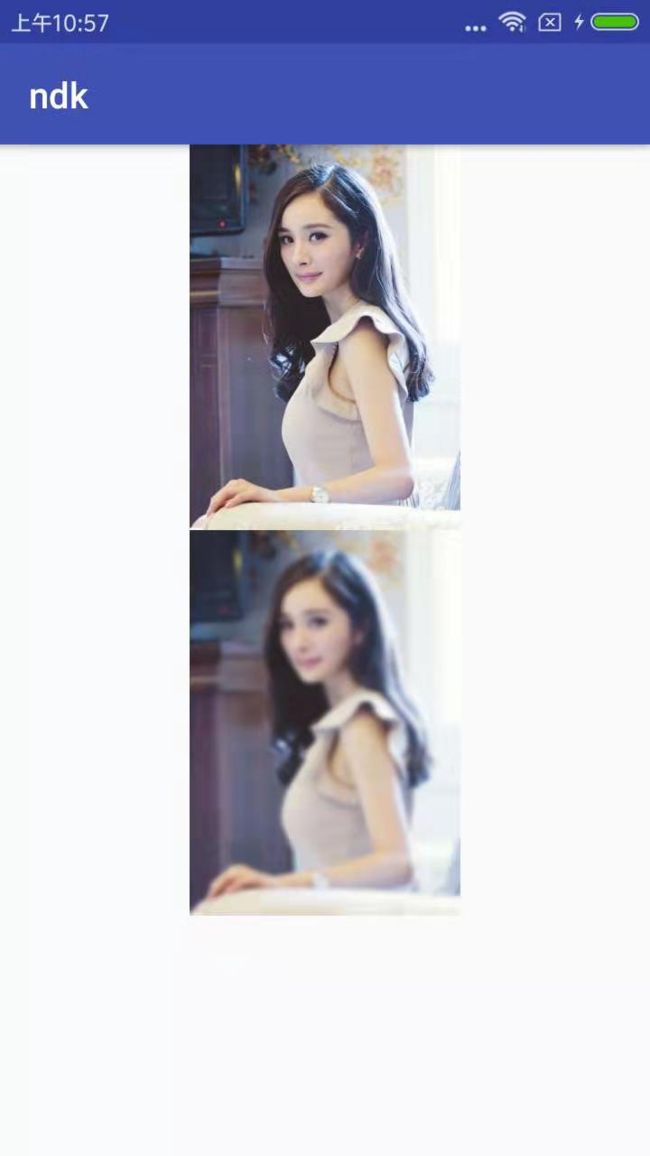首先两个工具类,mat转bitmap和bitmap转mat
#include
#include
#include
#include
#include
#include
#include
using namespace cv;
#define TAG "JNI_TAG"
#define LOGE(...) __android_log_print(ANDROID_LOG_ERROR,TAG,__VA_ARGS__)
/**
* bitmap转成mat
*/
Mat bitmap2Mat(JNIEnv *env, jobject bitmap) {
// 1. 获取图片的宽高,以及格式信息
AndroidBitmapInfo info;
AndroidBitmap_getInfo(env, bitmap, &info);
void *pixels;
AndroidBitmap_lockPixels(env, bitmap, &pixels);
Mat mat;
if (info.format == ANDROID_BITMAP_FORMAT_RGBA_8888) {
LOGE("nMatToBitmap: CV_8UC4 -> RGBA_8888");
mat = Mat(info.height, info.width, CV_8UC4, pixels);
} else {
LOGE("nMatToBitmap: CV_8UC2 -> RGBA_565");
mat = Mat(info.height, info.width, CV_8UC2, pixels);
}
AndroidBitmap_unlockPixels(env, bitmap);
return mat;
}
/**
* mat转成bitmap
*/
void mat2bitmap(JNIEnv *env, Mat src, jobject bitmap) {
// 1. 获取图片的宽高,以及格式信息
AndroidBitmapInfo info;
AndroidBitmap_getInfo(env, bitmap, &info);
void *pixels;
AndroidBitmap_lockPixels(env, bitmap, &pixels);
if (info.format == ANDROID_BITMAP_FORMAT_RGBA_8888) {
Mat tmp(info.height, info.width, CV_8UC4, pixels);
if (src.type() == CV_8UC1) {
LOGE("nMatToBitmap: CV_8UC1 -> RGBA_8888");
cvtColor(src, tmp, COLOR_GRAY2RGBA);
} else if (src.type() == CV_8UC3) {
LOGE("nMatToBitmap: CV_8UC3 -> RGBA_8888");
cvtColor(src, tmp, COLOR_RGB2RGBA);
} else if (src.type() == CV_8UC4) {
LOGE("nMatToBitmap: CV_8UC4 -> RGBA_8888");
src.copyTo(tmp);
}
} else {
// info.format == ANDROID_BITMAP_FORMAT_RGB_565
Mat tmp(info.height, info.width, CV_8UC2, pixels);
if (src.type() == CV_8UC1) {
LOGE("nMatToBitmap: CV_8UC1 -> RGB_565");
cvtColor(src, tmp, COLOR_GRAY2BGR565);
} else if (src.type() == CV_8UC3) {
LOGE("nMatToBitmap: CV_8UC3 -> RGB_565");
cvtColor(src, tmp, COLOR_RGB2BGR565);
} else if (src.type() == CV_8UC4) {
LOGE("nMatToBitmap: CV_8UC4 -> RGB_565");
cvtColor(src, tmp, COLOR_RGBA2BGR565);
}
}
AndroidBitmap_unlockPixels(env, bitmap);
}
绘制形状和文字
线,椭圆,矩形,圆,填充,文字
Mat src = bitmap2Mat(env, bitmap);
//线line
line(src, Point(100, 100), Point(200, 200), Scalar(255, 0, 0), 2, LINE_8);
//矩形rectangle
rectangle(src, Point(100, 100), Point(200, 200), Scalar(0, 0, 255), 2, LINE_8);
//椭圆ellipse
//第二个是椭圆的中心点
//第三个参数,椭圆的大小 第一个参数宽,第二个参数高
//第四个参数:旋转度数
ellipse(src, Point(src.cols / 2, src.rows / 2), Size(src.cols / 8, src.rows / 4), 180, 0, 360,
Scalar(0, 255, 255), 1);
//圆
circle(src, Point(src.cols / 2, src.rows / 2), src.cols / 8, Scalar(255, 255, 0), 2, LINE_AA);
//填充
Point pt[1][4];
pt[0][0] = Point(100, 100);
pt[0][1] = Point(100, 200);
pt[0][2] = Point(200, 200);
pt[0][3] = Point(100, 100);
const Point *pts[] = {pt[0]};
int nps[] = {4};
fillPoly(src, pts, nps, 1, Scalar(255, 0, 0),8);
//文字putText LINE_AA抗锯齿
putText(src,"OpenCV",Point(150,150),CV_FONT_BLACK,1,Scalar(0,0,255),1,LINE_AA);
效果图
图像的卷积操作和滤波操作
- 淹膜操作
所谓掩膜其实就是一个矩阵,然后根据这个矩阵重新计算图片中像素的值。可以过滤图像信息
Mat src = bitmap2Mat(env, bitmap);
//I(i,j)=5∗I(i,j)−[I(i−1,j)+I(i+1,j)+I(i,j−1)+I(i,j+1)]
Mat dest;
//生成一个和源图像大小相等类型相同的全0矩阵
dest = Mat::zeros(src.size(), src.type());
//获取图像的列数,一定不要忘记图像的通道数
int cols = (src.cols - 1) * src.channels();
//获取图像的行数
int rows = src.rows;
int offsetx = src.channels();
for (int row = 1; row < rows - 1; row++) {
//获取上一行
uchar *previous = src.ptr(row - 1);
//获取当前行
uchar *current = src.ptr(row);
//下一行
uchar *next = src.ptr(row + 1);
//输出
uchar *output = dest.ptr(row);
for (int col = offsetx; col < cols; col++) {
output[col] = saturate_cast(5 * current[col-offsetx] -
(previous[col] + next[col] + current[col - offsetx] + current[col + offsetx]));
}
}
mat2bitmap(env, dest, bitmap);
效果图
opencv实现掩膜操作
Mat src = bitmap2Mat(env, bitmap);
Mat dest;
//-1表示src的深度
Mat kernel;
kernel = (Mat_(3, 3) << 0, -1, 0, -1, 5, -1, 0, -1, 0);
filter2D(src, dest, src.depth(), kernel, Point(-1, -1));
mat2bitmap(env, dest, bitmap);
效果图
- 均值模糊
根据周边像素值来确定自己的像素值
Mat src = bitmap2Mat(env, bitmap);
Mat dest;
//均值模糊
//Size(w,h),只能是基数
blur(src,dest,Size(15,15),Point(-1,-1));
mat2bitmap(env, dest, bitmap);
- 高斯模糊
Mat src = bitmap2Mat(env, bitmap);
Mat dest;
//高斯模糊 保留了一些轮廓
//第四个参数sigmaX
GaussianBlur(src,dest,Size(15,15),0);
mat2bitmap(env, dest, bitmap);




